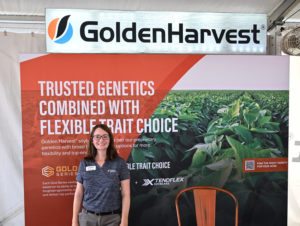Golden Harvest Golden Advantage Offers 0% Extended Terms
Heather Volpe, Golden Harvest marketing manager, says Golden Advantage reinforces their commitment to farmers, providing a financial edge as they begin planning for the new season. “And it’s a little bit different than a traditional loan. So farmers can still use their other credit lines for other farm inputs and utilize our 0% extended terms for the Golden Harvest corn and soybeans.”
Applications for use in the 2025 planting season must be submitted by May 2, 2025. Payment for Golden Harvest seed and Syngenta Seedcare products purchased for the 2024-2025 season is due in full on or before December 5, 2025.
Both seed and qualified seed treatment can be applied to a Golden Advantage account. Seed treatment applied by a local Seed Advisor downstream can also be applied to a Golden Advantage account.
Learn more in this interview with Volpe from the 2024 Farm Progress Show
FPS24 - Interview with Heather Volpe, Golden Harvest 2:21
Kip Tom Reflects on Trump Election
 Indiana farmer Kip Tom is one of several names being floated as possible Secretary of Agriculture in the new Trump Administration. Tom runs a successful international farming operation and served as Ambassador to the United Nations Agencies for Food and Agriculture during President Trump’s previous term.
Indiana farmer Kip Tom is one of several names being floated as possible Secretary of Agriculture in the new Trump Administration. Tom runs a successful international farming operation and served as Ambassador to the United Nations Agencies for Food and Agriculture during President Trump’s previous term.
“When I think about President Trump and comparing 45 to 47, my perception is he’s a lot more prepared this time to lead our nation, to make sure he is able to expedite the employment of good personnel around him and I think he’s working hard to make sure that day one that they’re going to be leading and making sure that he can deliver on the promises he made to our nation,” said Tom in an interview Thursday. “I would tell you I would be honored if asked to serve and I would serve at the pleasure of the President in any role that he would offer to me at that time, but right now I’m a farmer and I just want to help represent agriculture.”
Tom has served as co-chair of Farmers and Ranchers for Trump 47 and he believes the rural vote made the difference in the election. “I think it was a mandate on Tuesday. You look at how Americans voted and especially rural America, nearly 75% of rural America, agriculture and ranchers voted for Donald Trump. That was asking for a change,” said Tom.
In this interview, Tom talks about his reaction to the Trump victory, what he sees as priorities for the new administration in farm and energy policy, his thoughts on RFK Jr.’s potential influence in farm policy, and what kind of role he personally would like to play on the new Trump team. In addition, he gives his reflections on what it was like to be in Butler, Pennsylvania the day President Trump was nearly assassinated.
Interview with Kip Tom, Tom Farms 26:01Precision Ag News 11/7
Farm Groups Welcome Trump
 Agriculture organizations began sending congratulatory messages to President-elect Donald Trump early Wednesday, led by the American Farm Bureau Federation president Zippy Duvall.
Agriculture organizations began sending congratulatory messages to President-elect Donald Trump early Wednesday, led by the American Farm Bureau Federation president Zippy Duvall.
““Now that the American people have spoken, it’s time to put politics aside and begin the work of ensuring families nationwide can prosper,” said Duvall. “Among the most pressing issues in rural America is the need for a new, modernized farm bill. The two-year delay is unacceptable. The new administration must also address the impending tax hikes, which would crush many of America’s farmers and ranchers when stacked on top of inflation, high supply costs and market instability.”
Trump spoke at three Farm Bureau national conventions during his previous presidency.
National Farmers Union (NFU) President Rob Larew also offered his congratulations to President-elect Trump. “This transition to a new administration comes at a pivotal time for agriculture and rural America. At NFU, we believe that strong support for family farmers and ranchers is essential for vibrant rural communities and resilient economies… We stand ready to work with the incoming administration to build a future where agriculture can thrive, our food systems are resilient, and rural communities are supported.”
National Corn Growers Association President Kenneth Hartman Jr. said they look forward to working with the new administration and members of Congress to advance policy that is important to corn farmers. “We especially appreciate President Trump’s recognition that homegrown fuels, like ethanol, are important for our nation’s energy security and rural economies. We are also eager to work with his administration and Congress to enact improved farm policies and programs, expand market opportunities and build on the tax policies enacted during President Trump’s first term that are beneficial to corn farmers as they face a challenging financial outlook with low prices and high costs.”
National Cattlemen’s Beef Association (NCBA) Vice President of Government Affairs Ethan Lane said they are excited to work with the President-Elect to “undo the harm which cattle producers have endured under four years of “Bidenomics” and restore the free-market principles which have made U.S. cattle and beef the finest and safest in the world. Despite cattle prices soaring to record highs over the previous years, producers have been squeezed by exceptionally high input costs, record inflation, and the Biden Administration’s so-called competition agenda. This is the perfect opportunity to execute a hard reset on all of these failed policies.”
Grassley Says Lame Duck Farm Bill Unlikely
 Sen. Charles Grassley (R-IA) believes getting a farm bill through during the lame duck session of Congress is unlikely.
Sen. Charles Grassley (R-IA) believes getting a farm bill through during the lame duck session of Congress is unlikely.
“I haven’t heard of any movement during the month of October,” Grassley told reporters during a weekly call on Tuesday. “We have two weeks before Thanksgiving, we have three weeks before Christmas, and the way Schumer runs the Senate that’s only two and a half days a week so I don’t see how you can get it done.”
Grassley says there are some bills that have to get done before the end of the year but, “I don’t hear much about agriculture.” However, he does expect to see a one year extension of the current 2018 Farm Bill.
As far as next year’s deliberations on a farm bill, Grassley said there will definitely be pressure to cut spending until a Trump administration. If Republicans control both the House and Senate as well, he thinks it will be easier to get a farm bill but the Democrats will still fight against any food stamp reductions.
Grassley press call 18:45ASTA Wraps Up Forage, Turf and Conservation Seed Conference
 The American Seed Trade Association (ASTA) wrapped up its annual Forage, Turf and Conservation (FTC) Seed Conference in Kansas City, Missouri last week.
The American Seed Trade Association (ASTA) wrapped up its annual Forage, Turf and Conservation (FTC) Seed Conference in Kansas City, Missouri last week.
The meeting, held on October 29 in conjunction with the Western Seed Association Annual Meeting, gathers over 800 attendees in the conservation and grass seed sector to learn about the latest industry news, share the obstacles and the strategies to mitigate them, and explore business opportunities for the seed industry. Given the momentum surrounding conservation-related efforts, the U.S. forage, turf, and conservation sector has long been at the forefront of promoting seed as the solution for environmental initiatives.
“There is tremendous excitement surrounding the future of the seed industry…in the forage, turf, and conservation seed space,” said ASTA Chairman Dan Foor. “To that end, ASTA has been working to provide information on cover crop demand to support its members in making real-time business decisions to supply seed to farmers and landowners.”
The FTC Seed Conference included a full day of programming featuring speakers from the private and public sectors, offering the latest updates on cover crops, conservation programs, federal policy, and more. During closing remarks, Rob Wendell of the Native Seed Group was recognized for his four years of service as Chair of ASTA’s Environment and Conservation Seed Committee. Al Holleman of Agassiz Seed and Damon Winter of L&H Seeds were welcomed as the Committee’s new Chair and Vice Chair.
Coming up next month is ASTA’s 2024 Field Crop Seed Convention December 10-13 in Orlando, and registration is already open for the 64th Vegetable & Flower Seed Conference, January 31 – February 4, also in Orlando.
ALMDA Asks USDA to Delay Animal Disease Traceability Rule
 The American Livestock Markets and Dealers Association (ALMDA) has formally requested that USDA-APHIS delay the implementation or enforcement of the final rule on Use of Electronic Identification Eartags as Official Identification in Cattle and Bison (ADT Rule), scheduled to become effective today, November 5.
The American Livestock Markets and Dealers Association (ALMDA) has formally requested that USDA-APHIS delay the implementation or enforcement of the final rule on Use of Electronic Identification Eartags as Official Identification in Cattle and Bison (ADT Rule), scheduled to become effective today, November 5.
In a letter to USDA-APHIS, ALMDA requested that the implementation or enforcement of the ADT Rule be delayed at least 180 days ensure USDA, state animal health officials, veterinarians, tag manufacturers, and the entire industry are fully prepared support the ADT Rule in a way that does not reduce industry traceability, slow speed of commerce, or increase costs for livestock markets and dealers.
ALMDA, working alongside livestock markets, dealers, order buyers, veterinarians, and state animal health officials, has identified numerous gaps in the implementation plan and communicated these to USDA officials. In September, ALMDA provided USDA with data that illustrated potential issues with the ADT Rule. As the implementation date has approached, the issues ALMDA identified are becoming a reality.
“ALMDA understands the need to protect the U.S. livestock industry and the intent of the ADT Rule to make the traceability process faster and more accurate,” said ALMDA Chair Brian Forester, a livestock market owner from Texas. “We have been transparent with USDA and shared data from member livestock markets across the U.S. which illustrate the complexity and challenges associated with implementing the ADT Rule. At this time, livestock producers, tag suppliers, and state animal health officials have acknowledged they are not prepared to implement the rule so we believe it is in USDA and the industry’s best interest to delay rule implementation or enforcement.”





